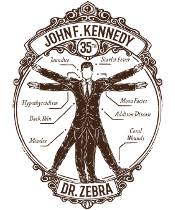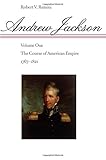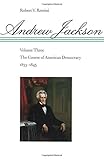

Health and Medical History of President
Andrew JacksonLived 1767-1845
Health and Medical History of President
Andrew JacksonLived 1767-1845
1776-1783
1812-1815
1846-1848
1861-1865
1898-1899
1917-1918
1941-1945
1950-1953
1964-1975
1990-1991
2001-2021

| UNDER CONSTRUCTION |
A fleck of dust rose from Jackson's coat and his left hand clutched his chest. For an instant he thought himself dying, but, fighting for self-command, slowly he raised his pistol.
Dickinson recoiled a step horror-stricken. "My God! Have I missed him?"
Overton [Jackson's second] presented his pistol. "Back to the mark, sir!"
Dickinson folded his arms. Jackson's spare frame straightened. He aimed... and fired. Dickinson swayed to the ground... [and later died].
[Jackson, too, was wounded, to the point where his left boot had filled with blood.]
Jackson's surgeon found that Dickinson's aim had been perfectly true, but he had judged the position of Jackson's heart by the set of his coat, and Jackson wore his coats loosely on account of the excessive slenderness of his figure.
- Parton, James. Life of Andrew Jackson. New York: Mason Brothers, 1861.
a p.667
Comment: The first of the multi-volume Jackson biographies. Three volumes.
- James, Marquis. The Life of Andrew Jackson. Indianapolis: Bobbs-Merrill, 1938.
a p.17 b pp.25-26 c pp.117-118 d p.157
Comment: A wonderful book that won the Pulitzer Prize for biography. It is actually composed of two books that were originally published separately: The Border Captain and Andrew Jackson: Portrait of a President.
- Remini, Robert V. The Life of Andrew Jackson. New York: Penguin, 1990 (hardback 1988).
 a p.8 b p.9 c p.7 d p.54 e p.70 f p.137 g p.223 h p.355 i p.356
a p.8 b p.9 c p.7 d p.54 e p.70 f p.137 g p.223 h p.355 i p.356Comment: Well-written, coherent distillation of Remini's definitive three-volume biography of Jackson.
- Deppisch LM, Centeno JA, Gemmel DJ, Torres NL. Andrew Jackson's exposure to mercury and lead: poisoned president?. JAMA. 1999 Aug 11;282(6):569-71.
- Sotos, John. Presidential disability and the twenty-fifth amendment. JAMA. 1995;274:799 [letter]. Pubmed: 7650802.
- MacMahon, Edward B. and Curry, Leonard. Medical Cover-Ups in the White House. Washington, DC: Farragut, 1987.
 a p.9
a p.9 - Parks, Lillian Rogers. My Thirty Years Backstairs at the White House. New York: Fleet Publishing, 1961.
a pp.210-211; this is word-of-mouth lore passed through generations of White House servants
Comment: This book stayed on the New York Times best-seller list for 26 weeks, prompting Jacqueline Kennedy to require all staff at the White House to sign a pledge agreeing not to write about their experiences (NY Times, page B8, Nov. 12, 1997). Parks's mother, a maid at the White House from 1909-1939, had actually been encouraged by Eleanor Roosevelt to write and publish a memoir (p260).
- James, Marquis. Andrew Jackson: Portrait of a President. New York: Grosset & Dunlap, unknown year (originally published in 1937 by Bobbs-Merrill).
a p.340













